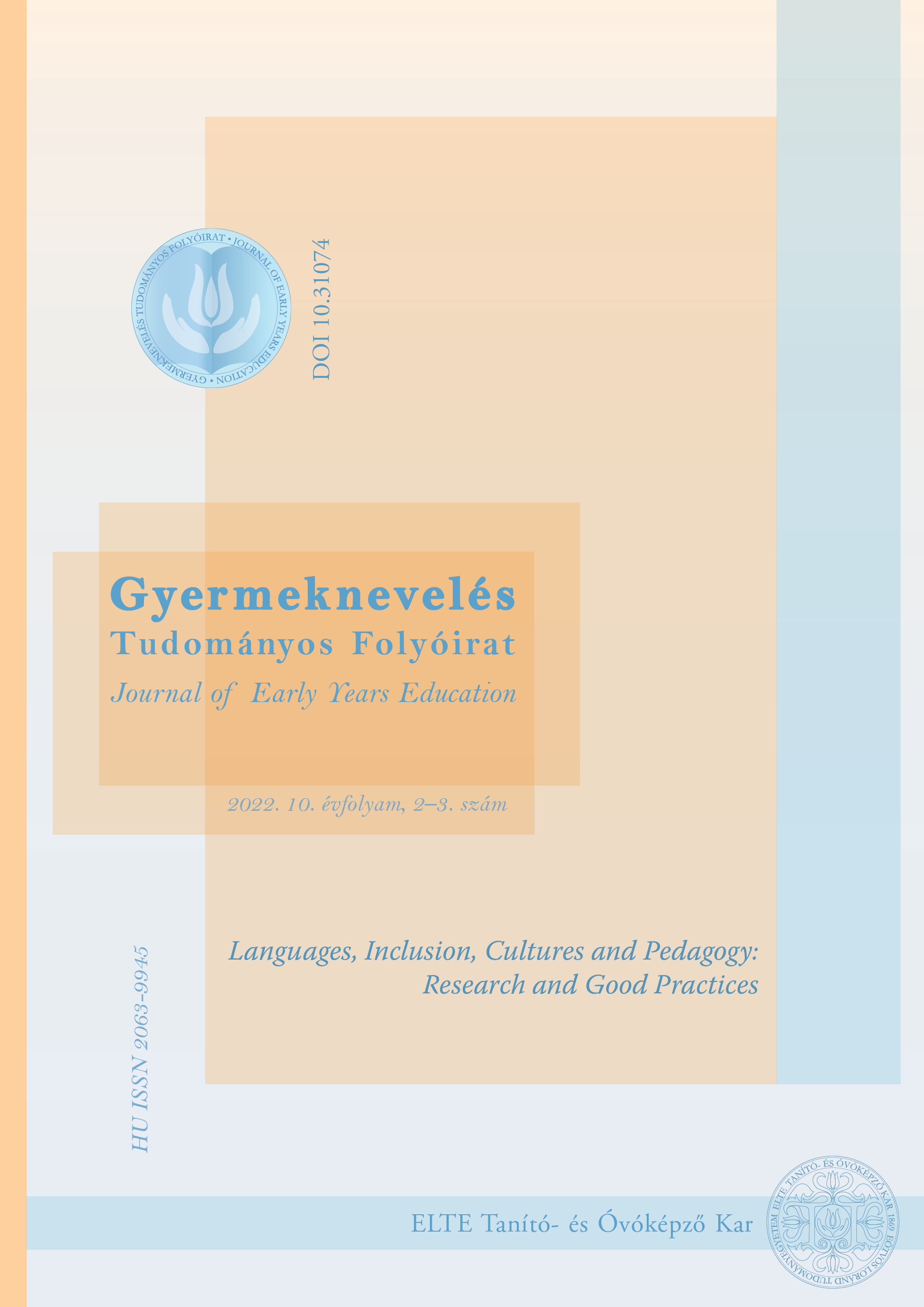Prevalence of cognitive and affective factors influencing mathematical performance
DOI:
https://doi.org/10.31074/gyntf.2022.3.190.204Kulcsszavak:
cognitive ability profile, mathematical skills, performance, math anxietyAbsztrakt
Children’s cognitive ability is the basis of all subject knowledge. It can qualitatively and quantitatively determine the content of the acquired curriculum, and its variation can significantly modify executive functions. There are a number of reasons for underachievement, including problems with genetic origin, parental expectations, the identity of the teacher, the class community, inadequate teaching methods, etc. These factors can trigger anxiety in students and not everyone may have the right coping strategies. The aim of our research is to establish a cognitive ability profile that focuses on the cognitive factors underlying mathematical abilities and the affective factors that influence them. Our research included at 10–15-year-old students in 8 Hungarian primary schools and explored the extent to which symptoms of anxiety affect mathematical performance. Our measuring instruments were the Pedagogical Examination of Dyscalculia and the Math Anxiety Test. The results were examined in the context of mathematical performance. Our research is also relevant in pedagogical practice, because it advances understanding of the cognitive and other psychological processes underpinning children’s performance, and thus can help them to achieve the best performance to their abilities more effectively. In this way, we can provide them with mathematical and self-knowledge that is useful in everyday life.
Letöltések
Hivatkozások
Atkinson and Hilgard’s (2014). Introduction to Psychology. Cengage Learning EMEA.
Baddeley, A. D. (2012). Working Memory: Theories, Models, and Controversies. Annual Review of Psychology, 6, 1-29. https://doi.org/10.1146/annurev-psych-120710-100422
Caviola, S., Carey, E., Mammarella, I. C. & Szűcs, D. (2017). Stress, Time Pressure, Strategy Selection and Math Anxiety in Mathematics: A Review of the Literature. Frontiers in Psychology, 8, 1488. https://doi.org/10.3389/fpsyg.2017.01488
Chan, W. W. L., Au, T. K. & Tang, J. (2013). Developmental dyscalculia and low numeracy in Chinese children. Research in Developmental Disabilities, 34(5), 1612–1622. https://doi.org/10.1016/j.ridd.2013.01.030
Cole, M. & Cole, R. S. (2001). Fejlődéslélektan. Osiris Kiadó.
Csépe, V., Győri, M. & Ragó, A. (2007). Nyelv, tudat, gondolkodás. In Csépe, V., Győri, M. & Ragó, A. (Eds..), Általános pszichológia 3. kötet. Osiris Kiadó.
Csíkos, Cs. & Szitányi, J. (2020). Teachers’ pedagogical content knowledge in teaching word problem solving strategies. ZDM Mathematics Education 52, 165–178. https://doi.org/10.1007/s11858-019-01115-y
Dékány J., Polgárdi, V., Láz, Cs. (2020). Matematikatanulási problémák hatékony és preventív mérése. A Diszkalkulia Pedagógiai Vizsgálata és Előszűrő Eljárása 1-4. (DPV; E-DPV). Logopédiai Kiadó.
Eysenck, M. W. & Calvo, M. G. (1992). Anxiety and Performance: The Processing Efficiency Theory. Cognition and Emotion, 6, 409–434. https://doi.org/10.1080/02699939208409696
Geary, D. C. (1995). Reflections of evolution and culture in children’s cognition: Implications for mathematical development and instruction. American Psychologist, 50, 24–37. https://doi.org/10.1037//0003-066x.50.1.24
Jármi, É. (2012). Számolási képességek fejlődése óvodás- és kisiskolás korban. Pszichológia, 32(4), 317‒339. https://doi.org/10.1556/Pszicho.32.2012.4.2
Kopp, M. & Skrabski, Á. (2003). Alkalmazott magatartástudomány. A megbirkózás egyéni és társadalmi stratégiái. Corvinus Kiadó.
Krajcsi, A. (2010). A numerikus képességek zavarai és diagnózisuk. Gyógypedagógiai Szemle, 38(2), 1–21.
Marin, M. F., Lord, C., Andrews, J., Juster, R. P., Sindi, S., Arsenault-Lapierre, G., Fiocco, A. J. & Lupien, S. J. (2011). Chronic stress, cognitive functioning and mental health. Neurobiology of Learning and Memory, 96(4), 583–595. https://doi.org/10.1016/j.nlm.2011.02.016
Meggyesné, H. T. & Nagyné, H. A. (2013). A tanulásban akadályozottak pedagógiájának komplex megközelítése. „Mentor(h)áló 2.0 Program” TÁMOP-4.1.2.B.2-13/1-2013-0008 projekt). http://www.jgypk.hu/mentorhalo/tananyag/A_tanulasban_akadalyozottak/51_a_kognitv_kpessgek_rendszere.html. (03.09.2020)
Myers, T., Carey, E. & Szűcs, D. (2017). Cognitive and neural correlates of mathematical giftedness in adults and children: A Review. Frontiers in Psychology, 8, 1646. https://doi.org/10.3389/fpsyg.2017.01646
Nótin, Á., Páskuné, Kiss J. & Kurucz, Gy. (2012). A matematikai szorongás személyen belüli tényezőinek vizsgálata középiskolás tanulóknál. Magyar Pedagógia, 112(4), 221–241.
Nótin, Á., Páskuné Kiss, J. & Kurucz, Gy. (2015). A tantárgyi szorongás kérdőív bemutatása. Alkalmazott pszichológia, 15(4), 109–131. https://doi.org/10.17627/ALKPSZICH.2015.4.109
Piros, V. &Séra, L. (2017). Az iskolai tanulásra való készenlét és a tanulási zavarok. In N. Kollár, K. & Szabó, É. (Eds.), Pedagógusok pszichológiai kézikönyve I. kötet (pp. 501–524). Osiris Kiadó.
Polgárdi, V., Csabáné, L. & Judit, D. (2018). Alapismeretek a Diszkalkulia Pedagógiai Vizsgálatáról. Gyermeknevelés Tudományos Folyóirat, 6(1), 24–54. https://doi.org/10.31074/gyn201812454
Prado, J. (2018). The interplay between learning arithmetic and learning to read: insights from developmental cognitive neuroscience. In Henik, A. (Ed.), Heterogeneity of Function in Numerical Cognition (pp. 27–49). Elsevier Academic Press. https://doi.org/10.1016/B978-0-12-811529-9.00002-9
Sandi, C. (2013). Stress and Cognition. Cognitive Science, 4(3), 245–261. https://doi.org/10.1002/wcs.1222
Séra, L. (2017). Percepció és figyelem. In N. Kollár, K. & Szabó, É. (Eds.), Pedagógusok pszichológiai kézikönyve I. kötet (pp. 347–386). Osiris Kiadó.
Svraka, B. (2016). A matematikai tudás és a szorongás kapcsolatának vizsgálata. Szakdolgozat. Szegedi Tudományegyetem Bölcsészettudományi Kar.
Szűcs, D. & Mammarella, I. C. (2020). Educational Practice Series 31. Math Anxiety. International Academy of Education (IAE).
Szűcs, D., Devine, A., Soltesz, F., Nobes, A. & Gabriel, F. (2014). Cognitive components of a mathematical processing network in 9-year-old children. Developmental Science, 17(4), 506–524. https://doi.org/10.1111/desc.12144
Trezise, K., & Reeve, R. A. (2017). The Impact of Anxiety and Working Memory on Algebraic Reasoning. In Understanding Emotions in Mathematical Thinking and Learning (pp. 133–158). Academic Press. https://doi.org/10.1016/B978-0-12-802218-4.00005-4
Zsolnai, A. & Kasik, L. (2012). Megküzdési stratégiák 8, 10 és 12 éves tanulók körében. Iskolakultúra, 22(4), 3–1.
##submission.downloads##
Megjelent
Verziók
- 2022-10-04 (2)
- 2022-07-13 (1)
Hogyan kell idézni
Folyóirat szám
Rovat
License
Copyright (c) 2022 Szerző

This work is licensed under a Creative Commons Attribution-NonCommercial-ShareAlike 4.0 International License.

